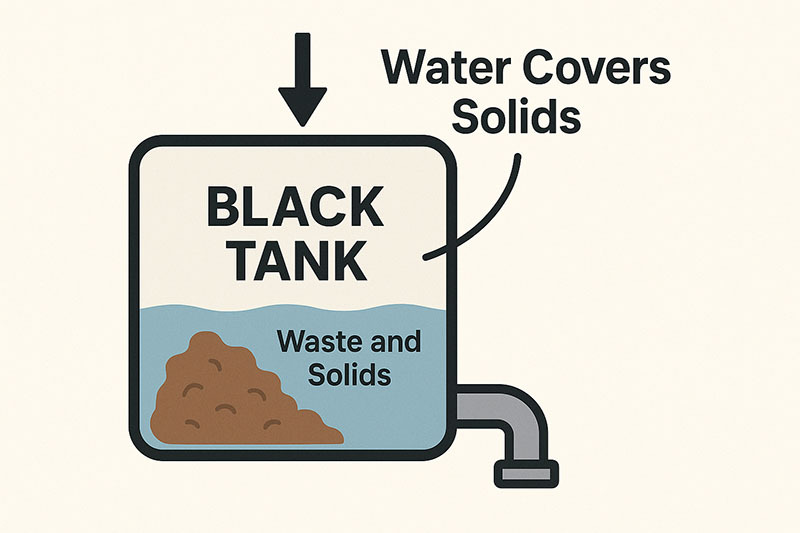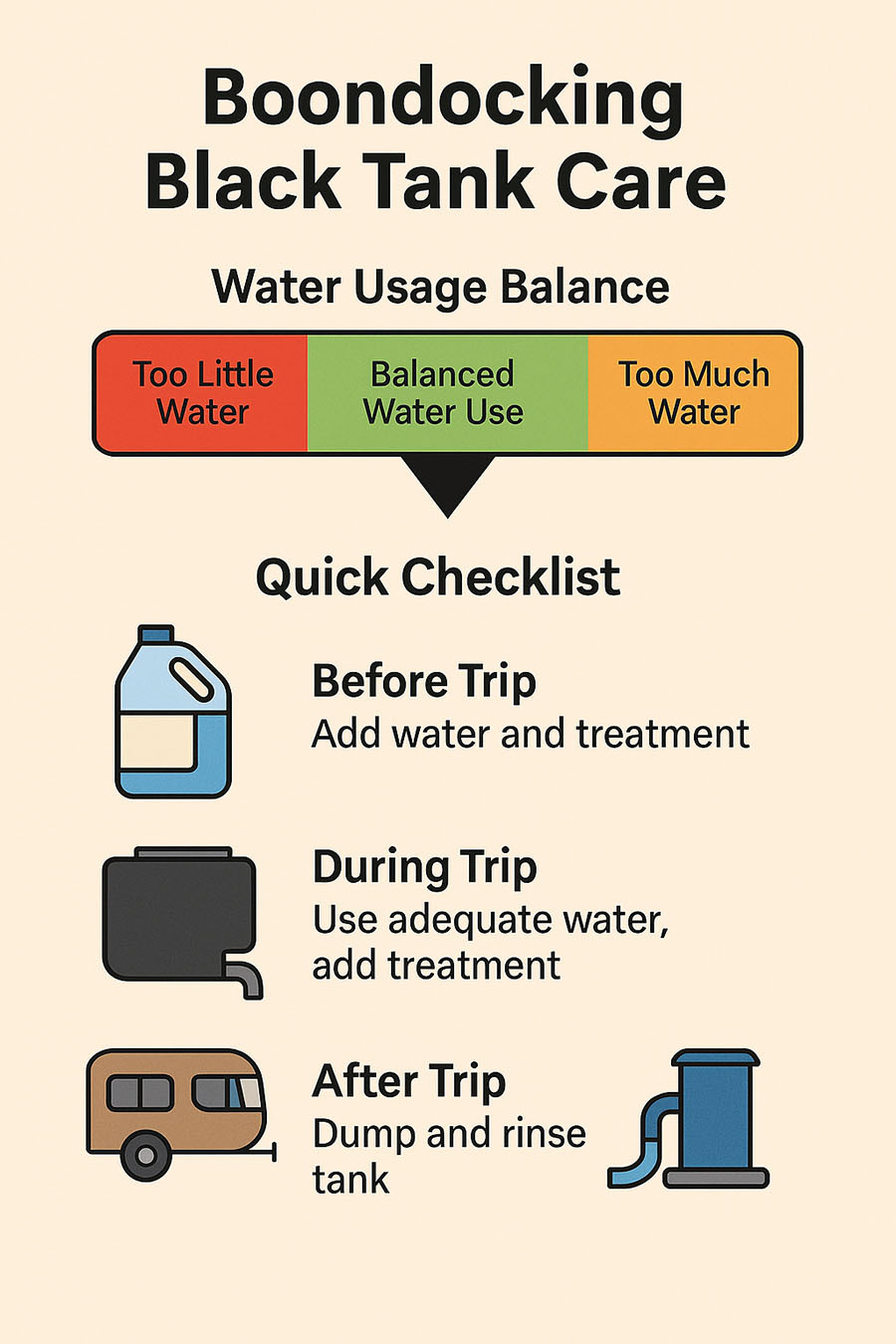Boondocking Black Tank Care: How to Manage Without Hookups
Posted by Happy Campers Store on Aug 18th 2025
Boondocking Black Tank Care: How to Manage Without Hookups
Learn how to maintain your RV black tank when boondocking off grid. This guide covers odor control, extending tank capacity, emergency fixes, and dumping responsibly without hookups.
What Is Boondocking and Why Does It Affect Black Tank Care?
Boondocking (also called dry camping or off-grid camping) means camping without water, sewer, or electrical hookups. While it allows RVers to enjoy remote locations and more freedom, it also creates special challenges for black tank care:
- No sewer hookups: You must make your black tank last longer between dumps.
- Limited fresh water: Using too little water per flush can cause clogs and odors.
- Hot weather risks: Heat accelerates odor buildup without proper treatment.
With the right strategies, you can prevent odors, avoid clogs, and enjoy longer boondocking stays without stress.

With Happy Campers it's essential to use just enough water to cover any solids in the tank to encapsulate odors completely.
Avoiding Compacted Tanks While Boondocking
Boondocking creates the perfect conditions for compacted tanks: low water use, longer stretches between dumps, and hot weather that dries waste onto the tank walls. Over time this creates stubborn buildup that leads to clogs, odors, and false sensor readings.
- Use enough water per flush to keep solids moving to the bottom.
- Drive-agitate when possible to help prevent waste from sticking to walls.
- Perform a full tank reset if you notice slow draining, bad odors, or “always full” sensors.
Learn how to fully strip buildup and restore flow: RV Holding Tank Reset: Step-by-Step Guide .
For regular maintenance between trips, see our in-depth guide on choosing the right cleaning method: Best Way to Clean an RV Waste Tank (Treatments vs Cleaners) .
How Much Water Should You Use When Flushing Off Grid?
Many RVers try to conserve water by flushing with the bare minimum, but this can backfire. Too little water creates a “pyramid of poo” that hardens in your tank and causes blockages.
Best practice for boondocking:
- Prime the tank: Start your trip by adding 2–3 gallons of water plus treatment.
- Per flush: Use at least 2–3 cups of water to cover waste and help it break down.
- Balance conservation: Don’t over-flush, but don’t risk a clog by under-flushing.
Remember: fixing a clog off grid is far harder than using a little extra water up front. If you think you have a clog, check out our Complete Guide to Diagnosing and Fixing a Black Tank Clog.

How Do You Control Black Tank Odors When Boondocking?
Odor control is one of the toughest challenges of off-grid RVing. Heat, bacteria, and waste buildup can quickly create smells that spread inside your RV.
Odor control tips for boondocking:
- Always keep water in the tank: Never let it run dry—gases escape when there’s no water barrier.
- Use a proven treatment: Happy Campers mineral-based treatment eliminates odors at the source, even in 100°F+ heat.
- Avoid chemical perfumes: Many products just mask smells instead of neutralizing them.
By staying consistent with treatments, you’ll stop odors before they start—even on long, hot boondocking trips.
How Do You Extend Black Tank Capacity Without Hookups?
When boondocking, every gallon counts. Here are practical ways to make your tank last longer:
- Drive-agitation method: Before traveling, add two gallons of water plus treatment. The sloshing action helps break down waste and keeps sensors clean.
- Use treatments consistently: Quality products liquefy waste and maximize usable capacity.
- Conserve flush water smartly: Use enough water to prevent clogs, but don’t waste it.
- Manage your gray tank: Your gray tank often fills faster—plan accordingly.
With these steps, you can extend your trip and avoid emergency dumps while off grid.
What Are Emergency Fixes for Black Tank Problems Off Grid?
Even with good habits, things can go wrong. Here are quick fixes when you don’t have hookups nearby:
- Clogged tank: Pour in several gallons of hot water with treatment, let it sit, then drive to agitate.
- Slow draining: Add water and treatment, wait several hours, then attempt to dump again.
- Persistent odors: Prime the tank with water and add extra treatment immediately.
Most emergencies can be stabilized until you reach a dump station—but prevention is always easier than fixing problems on the road.
What Is Proper Boondocking Black Tank Etiquette?
Black tank etiquette protects the environment and keeps boondocking sites open for everyone. Never dump waste on the ground. Instead:
- Plan ahead: Know where the nearest dump stations are before you camp.
- Dump responsibly: Always use an approved dump station.
- Rinse thoroughly: When possible, rinse your black tank at the dump station to prevent buildup.
Responsible dumping keeps campsites clean, safe, and accessible for future RVers.
Quick Boondocking Black Tank Checklist
- Before Trip: Add 2–3 gallons of water + Happy Campers treatment to prime the tank.
- During Trip: Use enough water per flush, add treatments, and drive-agitate when possible.
- End of Trip: Dump at a station, rinse thoroughly, and deep clean if needed. (See our black tank deep cleaning guide.)
FAQs About Boondocking Black Tank Care
How do you manage an RV black tank when boondocking?
Prime the tank with water and treatment, use at least 2–3 cups of water per flush, and plan dump stops in advance.
How long can you go without dumping your black tank off grid?
Most RV black tanks last 3–7 days for two people. With careful water use and treatments, you can extend this to over a week.
What’s the best RV black tank treatment for boondocking?
Happy Campers Holding Tank Treatment is mineral-based, eco-friendly, and proven to eliminate odors in extreme temperatures.
How much water should I use when flushing off grid?
Use at least 2–3 cups of water per flush. Too little water risks clogs, while too much fills your tank too quickly.
How do you prevent odors when camping without hookups?
Keep water in the tank at all times, add treatment regularly, and never let waste dry out in hot weather.
Final Thoughts
Boondocking lets RVers experience freedom and adventure far from crowded campgrounds—but it also requires smart black tank care. By balancing water use, using the right treatments, and dumping responsibly, you can enjoy worry-free trips without odors or clogs.
For more RV tank care resources, check out:


